Well, to be frank from what we know now there is no point: Putin seems to have shot himself in the foot badly and there seem to be no advantage of any kind he can gain from his ‘special operation’, the phrase the Russians are using in to avoid calling it a war.
I feel oddly uncomfortable referring to ‘the Russians’ in that way as if the bear some of the responsibility for the invasion. They don’t. This is Putin’s war, Putin’s doing, not Russia’s. ‘The Russians’ weren’t consulted, not least the parents and women who have already had a son or partner killed.
And given that, as is the way of dictators, Putin has now shut down every media outlet he does not control, the only ‘news’ a great many Russians are getting, especially those in the back of beyond, about what is going on in Ukraine is what Putin wants them to hear: that the ‘special operation’ was necessary to rid Ukraine of a cabal of Nazis who were perpetuating genocide (on whom is never made clear) and that Ukraine can be returned to the bosom of Mother Russia.
It is also all ‘going to plan’. So please, let’s not lump in ‘the Russians’ as being in any way to blame for the killing and bombing. This solely down to Putin and those around him supporting and facilitating him.
As for the ‘facts’ of the case, I would not deny that the West is also inclined to put a suitable spin on what is happening, but given the nature of our media it is very unlikely we are being spun a crock of lies simply because to do so is nigh-on impossible.
. . .
I shall, though, reiterate that all I can do in these blog entries as far as the ‘facts’ are concerned is repeat — parrot? — what I hear on the news and, to a lesser extent, read in the papers (though I am inclined to give more credence to reports in the Financial Times and The Economist than in the Daily Telegraph and the Daily Mail).
Apart from those facts, there is also the central mystery: why is Putin doing this? Why has a man who hitherto was regarded as supreme pragmatism and rational to a fault undertaken such a stupid operation.
One popular explanation is that he is ill, possibly with cancer or Parkinson’s and being treated with steroids. That, ‘they’ say, would explain his puffy face and, ‘they’ say, it could be the cause of what the tabloids call ‘roid rage’, personality change which makes you more aggressive.
Apart from those facts, there is also the central mystery: why is Putin doing this? Why has a man who hitherto was regarded as supreme pragmatism and rational to a fault undertaken such a stupid operation.
One popular explanation is that he is ill, possibly with cancer or Parkinson’s and being treated with steroids. That, ‘they’ say, would explain his puffy face and, ‘they’ say, it could be the cause of what the tabloids call ‘roid rage’, personality change which makes you more aggressive.
Bodybuilders who use a steroids a lot are known to suffer from ‘roid rage’ (two words which for the tabloids has the useful virtue of being just four letters each and which will fit very nicely in 200pt Franklin Gothic in a splash headline. What would fit was also a consideration when the tabloids arbitrarily renamed (‘dubbed’) Prince William as ‘Wills’ — shorter and more suited to a snappy headline).
We are also being told here in the West, and it is a very plausible explanation, that the pitiful nature of Putin’s invasion is because is intelligence service are so scared of him now that they tell him what they think he wants to hear. The same was true of Hitler.
We are also being told here in the West, and it is a very plausible explanation, that the pitiful nature of Putin’s invasion is because is intelligence service are so scared of him now that they tell him what they think he wants to hear. The same was true of Hitler.
So he seems sincerely to have believed that his invading troops would be welcomed by the Ukrainians with open arms and there would be very little resistance. That is one reason for his opening strategy, to send in light vehicles in an intended swift operation rather than rumble in with heavy and slower tanks. He seems to have expected to have taken over Kiev in a matter of days.
We are told he was also badly informed about the state of his armed forces. Supposedly a great deal of money has been spent over the past decade modernising his army, but we now believe a lot of the money was syphoned off to pay for baubles and yachts for those able to syphon it off.
We are told he was also badly informed about the state of his armed forces. Supposedly a great deal of money has been spent over the past decade modernising his army, but we now believe a lot of the money was syphoned off to pay for baubles and yachts for those able to syphon it off.
One example given is that the original tyres (US 'tires' though I don't know why) on one state-of-the-art military vehicle were substituted with cheap Chinese retreads which would and did not last at all long.
But in a sense all this is just me whistling in the wind. What is going to happen? Will Putin behave in some way which gives the West, as in Nato, not choice but to get involved, (and so far they have been keeping their noses very clean because of the likely consequences)? Could the war in Ukraine spread to other parts of Europe? Will nuclear weapons at some point be launched? Will other states hostile to the West — Iran and North Korea — use the problems the US and the West have on their plate to cause them trouble elsewhere?
One of the tunes we are, perhaps, whistling is that Xi Jinping, China's president (a kind of more upmarkat Vladimir Putin) is getting very worried about the effect the Ukraine war will have on the global economy. It seems that China's wheat harvest this year will be terrible and it will have to import wheat whose price is soaring because Ukraine will not be able to produce as much.
China imports 70% of its oil and 40% of its gas. So it will pay a hell of a lot more than most on oil it uses. Russia will, of course be able to offload some of the oil and gas the West will no longer be getting on China — but, China is not sentimental and given that beggars can't be choosers it will be able to push down the price considerably. It certainly won’t be paying top rouble, besties with Russia or not.
Another dilemma is that in world trade, China does far more business with the US and the EU than with Russia: just $147bn with Russia last year but $828bn with the EU and $756bn with the US. What with sanctions flying around, China will really not want trade with the EU and the US to collapse - and the comparatviely piddly Russian trade wouldn't help.
A related embarrassment for Xi is that at the launch ceremony for the Winter Olympics, his Vlad the Lad came along and Xi proclaimed him to be his best mate. All fine and dandy but . . . Did Putin tell him that he was
But in a sense all this is just me whistling in the wind. What is going to happen? Will Putin behave in some way which gives the West, as in Nato, not choice but to get involved, (and so far they have been keeping their noses very clean because of the likely consequences)? Could the war in Ukraine spread to other parts of Europe? Will nuclear weapons at some point be launched? Will other states hostile to the West — Iran and North Korea — use the problems the US and the West have on their plate to cause them trouble elsewhere?
One of the tunes we are, perhaps, whistling is that Xi Jinping, China's president (a kind of more upmarkat Vladimir Putin) is getting very worried about the effect the Ukraine war will have on the global economy. It seems that China's wheat harvest this year will be terrible and it will have to import wheat whose price is soaring because Ukraine will not be able to produce as much.
China imports 70% of its oil and 40% of its gas. So it will pay a hell of a lot more than most on oil it uses. Russia will, of course be able to offload some of the oil and gas the West will no longer be getting on China — but, China is not sentimental and given that beggars can't be choosers it will be able to push down the price considerably. It certainly won’t be paying top rouble, besties with Russia or not.
Another dilemma is that in world trade, China does far more business with the US and the EU than with Russia: just $147bn with Russia last year but $828bn with the EU and $756bn with the US. What with sanctions flying around, China will really not want trade with the EU and the US to collapse - and the comparatviely piddly Russian trade wouldn't help.
A related embarrassment for Xi is that at the launch ceremony for the Winter Olympics, his Vlad the Lad came along and Xi proclaimed him to be his best mate. All fine and dandy but . . . Did Putin tell him that he was
planning to invade Ukraine? If he did, Xi will look very bad indeed, especially in view of all the problems it might cause China. And bearing that in mind, it we might speculate that tried to talk Putin out of it.
If he did not? If he knew but kept schtumm? Well, it makes the image he likes to portray as the wise, farsighted, all-knowing leader China needs look very silly. Farsighted? Not quite. Xi Will not be a happy bunny and might no longer want to be besties with Vladimir.
So how's it all going to end? Who knows?























